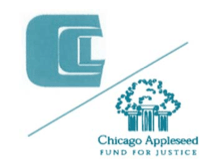Testimony: Justice Advocates Oppose Videoconferenced Criminal Proceedings
 Last week, Chicago Appleseed, Chicago Council of Lawyers, and several other criminal justice advocates submitted testimony objecting to an Illinois Supreme Court Proposal 12-01 (P.R. 0196).
Last week, Chicago Appleseed, Chicago Council of Lawyers, and several other criminal justice advocates submitted testimony objecting to an Illinois Supreme Court Proposal 12-01 (P.R. 0196).
Proposal 12-01 creates a rule permitting a criminal defendant to appear in many different proceedings via closed circuit television and videoconference. These proceedings include waiver of preliminary hearing, waiver of counsel, and submission of guilty pleas.
Justice advocates give the following four reasons for objecting to Proposal 12-01.
- Proposal 12-01 would experiment with videoconferenced proceedings conducted with individuals whose rights are already severely restricted.
- Videoconferencing technology reduces empathy, understanding, and trust between parties, and thus undermines essential aims of the justice system.
- Videoconferencing technology would compromise defendants’ right to effective assistance of counsel as well as the flexibility to resolve cases at the first opportunity.
- Potential financial benefits do not justify the human cost of videoconferencing.
Read the full testimony here: Proposal no. 12-01 (P.R. 0196) — Defendant’s Appearance by Videoconference.
Chicago Appleseed will be giving in-person testimony on Monday, December 10, 2012. If your organization wishes to sign on to this letter, please contact katywelter@chicagoappleseed.org prior to December 10.
The following advocates joined us in opposing Proposal 12-01:
Locke E. Bowman, Legal Director, Roderick and Solange MacArthur Justice Center, Northwestern University School of Law
Daniel Coyne, Clinical Professor of Law, Chicago-Kent College of Law
Matthew Daniels, Staff Attorney, Law Offices of Chicago-Kent College of Law
Craig Futterman, Clinical Professor of Law, Civil Rights and Police Accountability Project, Mandel Legal Aid Clinic, The University of Chicago Law School
Thomas F. Geraghty, Director, Bluhm Legal Clinic, Northwestern University School of Law
Institute on Public Safety and Social Justice, Adler School of Professional Psychology
Kathleen Kane-Willis, Director, Illinois Consortium on Drug Policy, Roosevelt University; Interim Director, Institute for Metropolitan Affairs, Roosevelt University
Reverend Al Sharp, Executive Director Emeritus, Protestants for the Common Good
Tracy Siska, Executive Director, Chicago Justice Project
Thomas Staunton, President, Chicago Council of Lawyers
Randolph N. Stone, Director, Criminal and Juvenile Justice Project, Mandel Legal Aid Clinic, The University of Chicago Law School
Paul Strauss, Co-Director of Litigation, Chicago Lawyers’ Committee for Civil Rights Under Law

